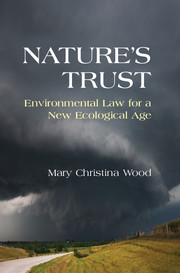Book contents
- Frontmatter
- Dedication
- Contents
- Preface
- Acknowledgments
- Part I Environmental Law: Hospice for a Dying Planet
- Part II The People’s Natural Trust
- 6 The Inalienable Attribute of Sovereignty
- 7 The Ecological Res
- 8 Fiduciary Standards of Protection and Restoration
- 9 From Bureaucrats to Trustees
- 10 Beyond Borders: Shared Ecology and the Duties of Sovereign Co-Tenant Trustees
- 11 Nature’s Justice: The Role of the Courts
- Part III The Public Trust and the Great Transition
- Notes
- Index
11 - Nature’s Justice: The Role of the Courts
Published online by Cambridge University Press: 05 June 2014
- Frontmatter
- Dedication
- Contents
- Preface
- Acknowledgments
- Part I Environmental Law: Hospice for a Dying Planet
- Part II The People’s Natural Trust
- 6 The Inalienable Attribute of Sovereignty
- 7 The Ecological Res
- 8 Fiduciary Standards of Protection and Restoration
- 9 From Bureaucrats to Trustees
- 10 Beyond Borders: Shared Ecology and the Duties of Sovereign Co-Tenant Trustees
- 11 Nature’s Justice: The Role of the Courts
- Part III The Public Trust and the Great Transition
- Notes
- Index
Summary
The cornerstone of any trust lies in judicial enforcement. If fiduciary obligations become unenforceable in court, a trustee can exert untrammeled power over the beneficiaries’ property and use that power to advance his own singular interests. Judge Learned Hand once stated that courts must have the ability to enforce fiduciary obligations, or what claimed to be a trust would amount to no more than a “precatory admonition.” Yet, by nearly all appearances, environmental law has degenerated into this. Government trustees today enjoy nearly unchecked control over Nature without the concomitant restraint and enforcement that a public trust demands.
As Chapter 5 presented, the modern statutory era of environmental law in the United States postured courts in a way that caused them to retreat from their meaningful role. Courts today render decisions under statutory law that rank fairly insignificant in the broad scheme of mounting ecological threats. Time and again, they fail to penetrate the systemic dysfunction that causes agencies to subvert statutory goals. The Nature’s Trust paradigm revives the constitutionally appointed role of courts as a coequal third branch of government positioned to enforce sovereign legal obligations toward the public’s natural assets. While this chapter principally focuses on the role of courts in the United States, the basic analysis carries relevance elsewhere as well. An active judiciary remains the cornerstone of trust protection in any country.
- Type
- Chapter
- Information
- Nature's TrustEnvironmental Law for a New Ecological Age, pp. 230 - 258Publisher: Cambridge University PressPrint publication year: 2013



